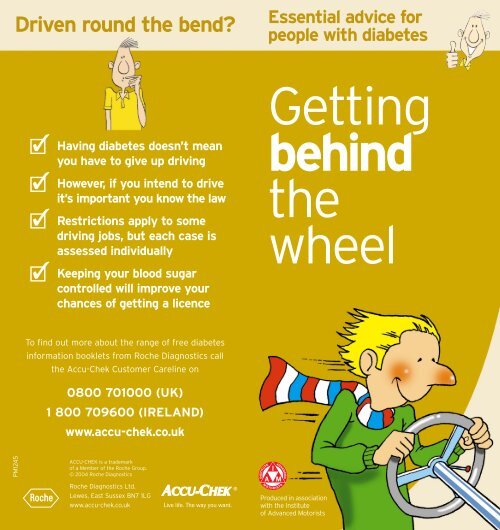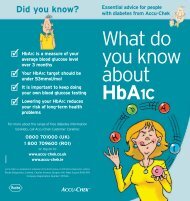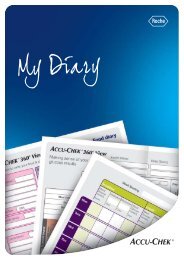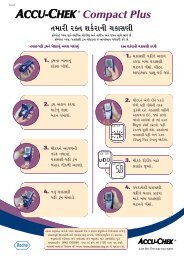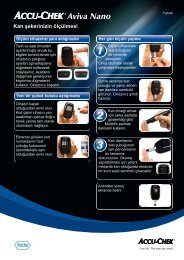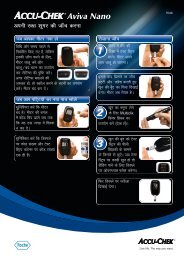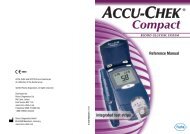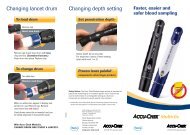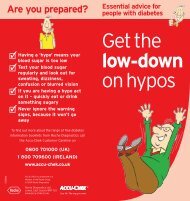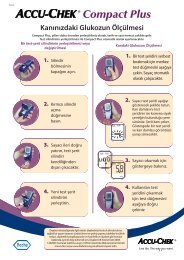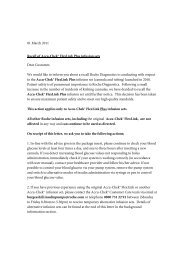Create successful ePaper yourself
Turn your PDF publications into a flip-book with our unique Google optimized e-Paper software.
Driven round the bend<br />
Essential advice for<br />
people with diabetes<br />
✓<br />
✓<br />
✓<br />
✓<br />
Having diabetes doesn’t mean<br />
you have to give up driving<br />
However, if you intend to drive<br />
it’s important you know the law<br />
Restrictions apply to some<br />
driving jobs, but each case is<br />
assessed individually<br />
Keeping your blood sugar<br />
controlled will improve your<br />
chances of getting a licence<br />
Getting<br />
behind<br />
the<br />
wheel<br />
To find out more about the range of free diabetes<br />
information booklets from Roche Diagnostics call<br />
the <strong>Accu</strong>-<strong>Chek</strong> Customer Careline on<br />
0800 701000 (UK)<br />
1 800 709600 (IRELAND)<br />
www.accu-chek.co.uk<br />
PM1245<br />
ACCU-CHEK is a trademark<br />
of a Member of the Roche Group.<br />
© 2004 Roche Diagnostics<br />
Roche Diagnostics Ltd.<br />
Lewes, East Sussex BN7 1LG<br />
www.accu-chek.co.uk<br />
Produced in association<br />
with the Institute<br />
of Advanced Motorists
<strong>Driving</strong> and diabetes<br />
...I practically live in my car, I don’t<br />
know what I’d do without it.<br />
Helen, 31<br />
Whether you drive for fun, convenience<br />
or work, having diabetes doesn’t mean<br />
you have to give up driving – but it does<br />
mean you have to be well prepared<br />
and well controlled. There are,<br />
however, some important legal and<br />
health issues you should know about.<br />
This booklet will help highlight some<br />
of the key issues you may face<br />
and will also give you a few hints<br />
and tips to keep you on the road<br />
and hazard-free.<br />
So, read on and happy motoring!
What does the law say<br />
...it’s better to know the law,<br />
know where you stand and not<br />
get caught out. Mike, 45<br />
If you have diabetes and intend<br />
to drive, the law requires you<br />
do the following things:<br />
1. Inform the DVLA<br />
●<br />
●<br />
if you’ve had diabetes for a while<br />
and are now applying for a<br />
driving licence<br />
if your diabetes is being<br />
treated with tablets<br />
or insulin<br />
(treatment with<br />
diet alone does not have to be declared)<br />
if your doctor has<br />
advised you against driving on account of<br />
your diabetes<br />
●<br />
Failure to inform the<br />
DVLA could result in a<br />
fine of up to £1000.<br />
2. Inform your insurance<br />
company<br />
● if asked about illness or<br />
diabetes (failure to do<br />
so will invalidate your<br />
cover in the event of a claim)<br />
●<br />
●<br />
if your treatment changes and you begin<br />
tablets or insulin<br />
if you develop diabetes-related problems<br />
that may affect your ability to drive safely<br />
If you ride a<br />
motorcycle or<br />
scooter, the same<br />
rules apply.
What does the DVLA need from me<br />
...being turned down is a bit<br />
of a worry, but I guess they<br />
have to keep the roads safe.<br />
Marcus, 19<br />
The Driver and Vehicle Licensing Agency<br />
(DVLA) has an obligation to make sure<br />
the roads are safe for people to use.<br />
To do this, the DVLA asks a series of health<br />
related questions when you apply for a<br />
licence and may decide to seek medical<br />
advice from your doctor –<br />
this doesn’t mean<br />
you’ll be refused<br />
a licence.<br />
If your diabetes<br />
is well controlled<br />
there shouldn’t be any<br />
objection to you holding<br />
a valid driving licence, so<br />
read on to find out<br />
how to apply.<br />
Vehicle licence application form<br />
Answer YES to the question relating<br />
to diabetes.<br />
Provide details of the treatment<br />
you are on:<br />
Insulin<br />
You will be sent another form called<br />
a ‘Diabetic 1’. It will request your GP’s<br />
details and will ask your consent<br />
to approach your doctor.<br />
Tablets/diet<br />
You will be sent a letter<br />
explaining that you must<br />
inform the DVLA of changes to<br />
your treatment or any diabetes<br />
complications you may develop.
You and your licence<br />
...I reapply every few years,<br />
but I’m well controlled<br />
so it’s just a formality really.<br />
Brody, 33<br />
The DVLA issues two different<br />
types of driving licence<br />
according to individual<br />
circumstances.<br />
Restricted licences<br />
Valid for one, two, or three<br />
years. If you are treated<br />
with insulin you will be<br />
issued one of these.<br />
They are renewed<br />
free of charge and<br />
you will receive a reminder through the post<br />
just before the expiry date.<br />
Till 70 licences<br />
Valid until you are 70 years<br />
of age. If you’re treated with<br />
diet alone you will receive<br />
one of these.<br />
So long as your diabetes<br />
doesn’t develop complications<br />
or your treatment changes, this<br />
licence will only need renewing<br />
when you are 70 years old. Then,<br />
like everyone else over 70, you will be switched<br />
to a restricted licence and charged a fee.<br />
If you are treated with tablets you could<br />
receive either type, depending on the<br />
DVLA’s assessment of your case.
Your doctor and special health issues<br />
It’s usual for your doctor to provide an<br />
overview of how well you’re doing based on<br />
your individual circumstances and blood<br />
sugar control. This gives the DVLA guidance<br />
when assessing your ability to drive.<br />
Be clear and open with your doctor when<br />
discussing your diabetes<br />
experiences. That way, they<br />
can offer advice and<br />
treatment to keep you<br />
on top.<br />
After all, the better your<br />
control, the more chance<br />
you’ll have of<br />
getting a<br />
licence and the<br />
safer you’ll be on<br />
the road – for you and other road users.<br />
Remember, it’s not necessarily the<br />
treatment you receive that could limit<br />
your access to a driving licence, but the<br />
control you have over your blood sugar.<br />
Eyesight<br />
Pregnancy<br />
Clearly, good eyesight<br />
is vital for safe driving.<br />
You need to be able to<br />
judge distance and also<br />
have a 120° field<br />
of vision. Talk to your<br />
doctor or eye specialist<br />
for more information.<br />
If you develop diabetes while<br />
pregnant and have to start on<br />
insulin, you must inform the<br />
DVLA immediately.<br />
If your control is good,<br />
you should be able to<br />
continue driving on your<br />
current licence. Contact<br />
the DVLA again six weeks<br />
after your baby has been<br />
delivered to have your status<br />
looked at again.
Large vehicles & driving for work<br />
...I drive a lot for work,<br />
so where does that leave me<br />
Fred, 40<br />
Certain jobs require<br />
a lot of driving,<br />
or require you to<br />
drive particular<br />
types of vehicle. Licences<br />
for heavy vehicles, or passenger<br />
carriers are not routinely issued, although<br />
assessments can be made based on<br />
individual cases.<br />
In any case, if you are driving, it’s best you test<br />
regularly, take the necessary precautions<br />
and follow good driving practice for people<br />
with diabetes.<br />
Remember, cutting corners<br />
with your diabetes care can put<br />
your life and the lives of others<br />
in danger.<br />
Rules for minicab licences vary from<br />
region to region and it’s best to check<br />
with your local council.<br />
If your work involves driving abroad,<br />
ask your doctor for advice and check<br />
with your insurance company to see<br />
if you’re covered.
<strong>Driving</strong> and hypoglycaemia<br />
Hypoglycaemia is a common worry for<br />
people with diabetes, but with the right<br />
preparations it can be properly managed.<br />
If you follow good driving practice for<br />
people with diabetes there shouldn’t be<br />
any problems. Keep snacks in your<br />
vehicle, test before starting and<br />
every two hours during your<br />
journey, and take regular breaks. Some<br />
diabetes tablets could make you hypo –<br />
check with your doctor or nurse if you’re<br />
unsure about yours.<br />
What to do if you feel hypo<br />
while driving<br />
• Stop driving as soon as it is safe<br />
to do so and secure your vehicle<br />
• Do not start again<br />
until the symptoms have gone<br />
• Take glucose tablets, biscuits or<br />
a sugary drink<br />
• Eat some carbohydrate<br />
DO NOT drink alcohol and drive –<br />
you’re at greater risk.<br />
How to spot a hypo<br />
• Sweating and hunger<br />
• Shakiness and heart flutter<br />
• Faintness or dizziness<br />
• Nausea or headache<br />
• Blurred vision or tingly lips<br />
• If safe to do so, take the keys out<br />
of the ignition, step out of the car<br />
or move to the passenger seat.<br />
This removes any question that<br />
you were in charge of a<br />
vehicle while under the influence of<br />
drugs – that includes insulin<br />
If you’re unable to sense when<br />
you are getting a hypo, you<br />
probably shouldn’t be driving.
Getting to grips with insurance<br />
...some companies really try<br />
it on, so it’s definitely worth<br />
shopping around. Lisa, 26<br />
You must inform your insurance<br />
company if you have diabetes. If<br />
you’re worried how this will affect<br />
your premiums, don’t be. With the<br />
introduction of the Disability<br />
Discrimination Act, there should be no<br />
increase in premiums unless there’s<br />
evidence of increased risk in a<br />
particular group of people.<br />
National records do NOT show people<br />
with diabetes to be at a higher risk than<br />
the rest of the population. However,<br />
you may find that individual companies<br />
use their own records to justify higher<br />
premiums. This can be challenged.<br />
If you need assistance,<br />
you can always call the<br />
Diabetes UK Careline on<br />
0845 120 2960.
Accidents and diabetes<br />
If you’re hypo when you have an accident, the<br />
police may charge you with driving under the<br />
influence of a drug (insulin), driving without<br />
due care and attention, or<br />
dangerous driving. Testing your<br />
blood sugar regularly will help you stay<br />
in control, but if you do have<br />
an accident, you need to:<br />
Further information on driving<br />
and diabetes:<br />
Diabetes UK Careline<br />
0845 120 2960<br />
www.diabetes.org.uk<br />
DVLA Medical Group<br />
0870 600 0301<br />
(Monday to Friday, 8.15am to 4.30pm)<br />
DVLA<br />
0870 240 0009<br />
(Monday to Friday, 08:00 – 20:30<br />
and Saturday 08:00 – 17.30)<br />
1. Seek legal advice immediately<br />
2.Inform the DVLA if you were<br />
hypo at the time<br />
Taking an advanced driving course can<br />
teach you additional techniques to keep<br />
you safe and enjoying being on the road –<br />
and it may even lower your insurance<br />
premiums.<br />
Institute of Advanced Motorists (IAM)<br />
020 8996 9600<br />
www.iam.org.uk<br />
Irish Advanced Motorists<br />
056 7771778<br />
www.irishadvancedmotorists.ie<br />
Royal Society for the Prevention<br />
of Accidents (ROSPA)<br />
email: mrae@rospa.com<br />
www.roada.org.uk


